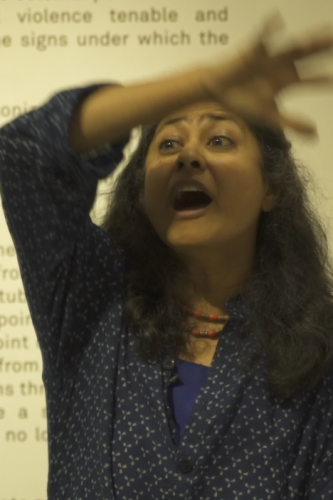
Vazira Fazila-Yacoobali Zamindar
Biography
Vazira Fazila-Yacoobali Zamindar works on decolonization, displacement, statelessness, war, non-violence, the visual archive and contemporary art. Her book, The Long Partition and the Making of Modern South Asia: Refugees, Boundaries, Histories (Columbia University Press, 2007; Penguin India 2008; Mashal Books, Urdu edition, 2014) combined oral histories with archival research to examine the formation of refugees, borders and citizenship in the devastating aftermath of 1947. Stories from the book have been performed by the Delhi-based Dastangoi in Dastaan-e-Partition, and the book has been an inspiration for Mara Ahmad’s film A Thin Wall (2015), Shayma Sayid’s dance Kanhaiya yaad hai kuch bhee hamari (South Bank Center, London, August 2017), the San Francisco Enacte Arts’ play The Parting (2018) and Project Dastaan’s animation Rest in Paper (2021).
Her second book project takes on the history of archaeology, art history, photography, film, war and anticolonial resistance on the Indo-Afghan borderland, and over the years she has received several fellowships, including the National Endowment for the Humanities (NEH) and the Fulbright, for research on this project. In 2020-21 she was visiting research fellow at the Collaborative Research Center for Affective Societies, Freie Universität Berlin when she began a collaboration with the graphic novelist Sarnath Banerjee who resides in the city. The Salomon Research Grant is supporting their graphic novel that draws on this research, and focuses on Gandhi and Abdul Ghaffar Khan. A research residency at the Vasl Artists Association that year allowed her to consider the politics and possibilities of an artist’s practice in the colonial archive, and resulted in a solo show, Anticolonial, at the Canvas Gallery in Karachi, Pakistan.
She directed the South Asian Studies Program at the Watson Institute from 2012-2016. In that position she ran a South Asia lecture series, co-organized the Brown-Harvard Pakistani Film Festivals of 2014 and 2015, which resulted in the co-edited book Love, War and Other Longings: Essays on Cinema in Pakistan (Oxford University Press, 2020), and established an interdisciplinary reading group called Theory from the South. That reading group became the series Art History from the South (2018-2020) and two outcomes of that include a symposium and co-edited book with Tapati Guha-Thakurta entitled How Secular is Art? On the Politics of Art, History and Religion in South Asia (Cambridge University Press, 2023). It also led to a collaboration with Foad Torshizi (RISD) and Joshua Cohen (CUNY) on Art History, Postcolonialism and the Global Turn (forthcoming as a special issue of Art Margins in July 2023).
In addition to public teach-ins, she has worked with Primary Source and the Choices Program, FirstWorks Providence, the RISD Museum, as well as the Lahore Museum. She has appeared on Christopher Lydon's Open Source Radio and the BBC Radio series Museum of Lost Objects, and her articles have appeared in e-flux, Hyperallergic, Third Text, Times of India, The News, Dawn, Time Out Delhi, Caravan, Current History and The Wire.